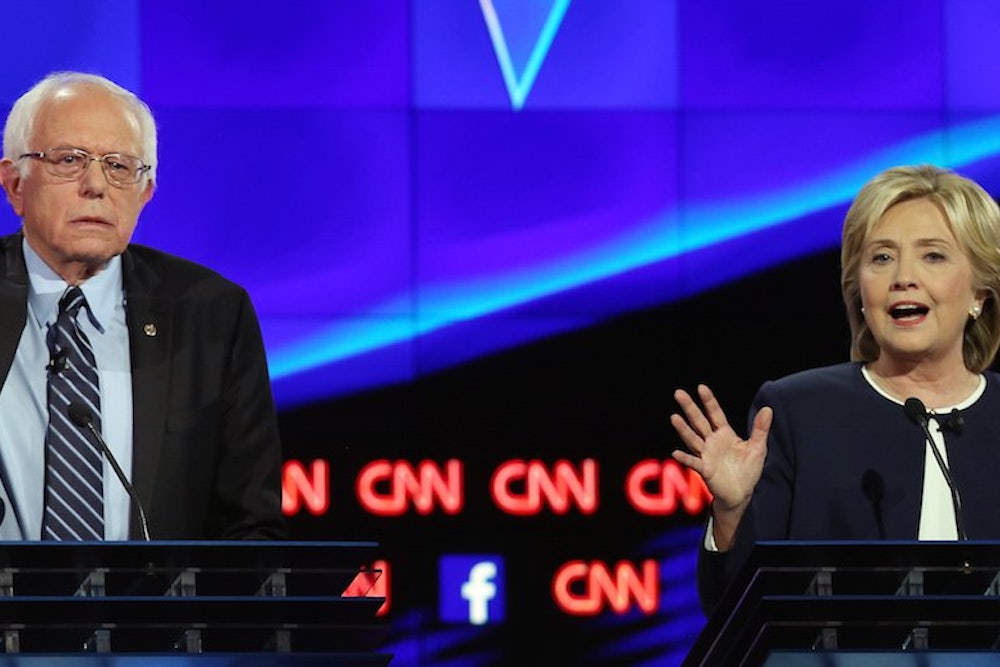Climate change has officially entered prime-time politics. In the initial moments of this year's first Democratic presidential primary debate, four of the five candidates raised the issue in their opening statements—a stark contrast not only to the Republican candidates, who hardly mentioned climate change at all in their two debates to date, but also to previous election cycles. In the past, climate change has barely rated more than a passing mention from candidates of either party. At best, it's been presented as part of a laundry list of issues facing America and the world. But now the Democratic candidates have at long last internalized it as a central part of their platforms, and that came through on Tuesday night.
Democratic frontrunner Hillary Clinton said she plans to invest in clean energy and infrastructure, by “taking the opportunity posed by climate change to grow our economy.” Vermont Senator Bernie Sanders identified global warming as a key issue of his campaign, calling the transition away from fossil fuels a "moral responsibility."
Former Maryland Governor Martin O'Malley echoed their sentiments. "We must square our shoulders to the great challenge of climate change and make this threat our opportunity,” he said. For Lincoln Chafee, the former governor of Rhode Island, climate change represents "a real threat to our planet." Only the most conservative candidate of the bunch, Virginia Senator Jim Webb, failed to mention it.
In the past, that might have been the end of the discussion. Not so on Tuesday night. Later in the debate, CNN's Anderson Cooper, the moderator for the evening, asked the candidates to identify what they viewed as the greatest threat to national security. Chafee mentioned "chaos" in the Middle East, Webb cited China, and Clinton warned of terrorists obtaining nuclear weapons. But O'Malley and Sanders highlighted the likelihood that the warming planet will aggravate political instability. O’Malley mentioned climate change's "cascading threats," along with ISIS and nuclear Iran, while Sanders delivered the most forceful answer to the question.
“The scientific community is telling us that if we do not address the global crisis of climate change, transform our energy system away from fossil fuel to sustainable energy, the planet that we're going to be leaving our kids and our grandchildren may well not be habitable," he said. "That is a major crisis.”
This is a strong contrast to the current Republican candidates, who dismiss the idea that climate change is man-made, oreven a problem. During Tuesday's debate, Mike Huckabee tweeted:
They believe climate change is a greater threat than Islamic extremism, that a sunburn is worse than a beheading. It's nonsense! #DemDebate
—
govmikehuckabee
The numbers prove Huckabee wrong. President Barack Obama has pressed this point, but if you don’t want to take a liberal president’s word on it, then look to his predecessor, George W. Bush, whose military experts warned of climate change’s security implications for the next 20 years.
Even so, in 2007, climate change received little more than a nod in the Democratic primaries. “We've got major global challenges like climate change,” then-senator Obama offered during one debate. At the time, Clinton called for “an energy policy that puts us on the right track to deal with climate change.” But the candidates never clamored to out-do each other on their climate policies, and there was little urgency to the debate.
In the 2012 presidential election, environmentalists begged Obama to mention greenhouse gasses, but he never addressed it directly. Indeed, Obama's final debate against Republican presidential candidate Mitt Romney was notable in that there was no mention of climate change whatsoever—not even a passing one.
More recently, however, Obama has made climate change a central focus of his second term—a mantle the Democratic candidates hope to pick up. We're finally seeing talk turn to action, with climate deals between the United States and China. Hopes are high that world powers will be able to negotiate a climate accord in Paris later this year that will cut carbon emissions significantly by mid-century.
The fact that the Democratic candidates chose to highlight climate change illustrates just how far we've come in even the past few years alone.
